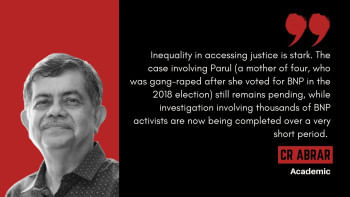A rights body that remains paralysed

The long-standing issues plaguing the National Human Rights Commission (NHRC) have re-surfaced yet again, as its annual report has revealed that since 2012, almost two-thirds of its enquiry requests to the home ministry over cases of human rights violation by law enforcers have been ignored. Out of 122 requests for reports, only 44 have been adequately responded to. This illustrates how little leverage and authority the commission has to address such violations, giving rise to the age-old question: what's even the point of having this commission if it can't fulfil its duty?
Aside from the obvious political pressure that suppresses the commission—due to which it cannot thoroughly investigate the many allegations of surveillance, enforced disappearances, and extrajudicial killings—the NHRC is heavily constrained by its very founding law. The National Human Rights Commission Act, 2009 restricts the commission from investigating any disciplined forces, including police and Rab. It only allows the NHRC to request reports and information from the home ministry, or recommend that the ministry conduct investigations. Not only does the NHRC's role largely remain on paper, ironically, it's the paper (legislation) that stops the commission from doing its job.
Due to this legal shortcoming among other reasons, the NHRC is not considered fully compliant with the Paris Principles, the international benchmark for national human rights institutions around the world. Let's not forget that the NHRC, whose recruitment process is heavily influenced by the government, was ranked second-to-last in South Asia last year, as per an evaluation by the Asian NGO Network on National Human Rights Institutions. All these point to one conclusion: the narrative that the commission is an independent, statutory body authorised to monitor and investigate rights violations, no matter who the perpetrators may be, is far from the truth.
While law enforcement agencies have mechanisms for internal investigations, time and again we have seen just how flawed and motivated they can be. Officers rarely get convicted for an offence, with transfers and temporary suspensions often being the end of it. Right now, what is essential is amending the NHRC law, so that the commission has the power to investigate officers itself. According to the NHRC chairman, who is all for the amendment, this will not harm anyone in the forces, but rather help identify wrongdoers.
Currently, the commission's proposal to amend the NHRC Act, submitted to the government, has been "stuck," said its chairman. Countless times, government high-ups have made the claim that the state does not shelter any perpetrator, regardless of their status and position. If that is indeed the case, the administration has the perfect chance to prove it, by doing away with the section that bars the NHRC from investigating law enforcers directly.


 For all latest news, follow The Daily Star's Google News channel.
For all latest news, follow The Daily Star's Google News channel. 









Comments